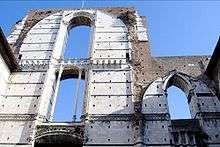Counting the cost
Counting the Cost, or in the NIV: The Cost of Being a Disciple or in the NRSV: The Cost of Discipleship or in the NKJV: Leaving All to Follow Christ, are titles given to the Gospel of Luke passage Luke 14:25-33 which includes a pair of parables told by Jesus. The first title comes from the phrase "count the cost", which occurs in the King James Version of the passage, as well as some other versions.

Narrative
The two parables are as follows:
And there went great multitudes with him: and he turned, and said unto them, If any man come to me, and hate not his father, and mother, and wife, and children, and brethren, and sisters, yea, and his own life also, he cannot be my disciple. And whosoever doth not bear his cross, and come after me, cannot be my disciple. For which of you, intending to build a tower, sitteth not down first, and counteth the cost, whether he have sufficient to finish it? Lest haply, after he hath laid the foundation, and is not able to finish it, all that behold it begin to mock him, saying, This man began to build, and was not able to finish. Or what king, going to make war against another king, sitteth not down first, and consulteth whether he be able with ten thousand to meet him that cometh against him with twenty thousand? Or else, while the other is yet a great way off, he sendeth an ambassage, and desireth conditions of peace. So likewise, whosoever he be of you that forsaketh not all that he hath, he cannot be my disciple.
— Luke 14:25-33, King James Version
Large crowds were traveling with Jesus, and turning to them he said: “If anyone comes to me and does not hate father and mother, wife and children, brothers and sisters—yes, even their own life—such a person cannot be my disciple. And whoever does not carry their cross and follow me cannot be my disciple.
"Suppose one of you wants to build a tower. Won't you first sit down and estimate the cost to see if you have enough money to complete it? For if you lay the foundation and are not able to finish it, everyone who sees it will ridicule you, saying, 'This person began to build and wasn’t able to finish.'
"Or suppose a king is about to go to war against another king. Won't he first sit down and consider whether he is able with ten thousand men to oppose the one coming against him with twenty thousand? If he is not able, he will send a delegation while the other is still a long way off and will ask for terms of peace. In the same way, those of you who do not give up everything you have cannot be my disciples.
— Luke 14:25-33, NIV
Interpretation
Joel B. Green suggests that it is unclear what kind of tower is being referred to in the first parable,[1] but notes that the message is that a "thoroughgoing fidelity to God's salvific aim"[1] is required, "manifest in one's identity as a disciple of Jesus."[1] This involves putting family and possessions second,[2] as in Matthew 8:18-22 and Luke 9:57-62.
This verse is of great importance to Anabaptist groups such as the Hutterites and Bruderhof who interpret it as a call to live without private property or possessions.[3] To them, "to forsake all that he has" is an instruction to give up everything in the service of Jesus.
References
- Joel B. Green, The Gospel of Luke, Eerdmans, 1997, ISBN 0-8028-2315-7, pp. 566-567.
- Charles McCollough, The Art Of Parables: Reinterpreting the Teaching Stories of Jesus in Word and Scripture, Wood Lake Publishing, 2008, ISBN 1-55145-563-3, pp. 94-95.
- "Learning from the Bruderhof: An Intentional Christian Community". ChristLife. Retrieved 2017-10-27.